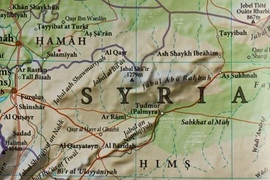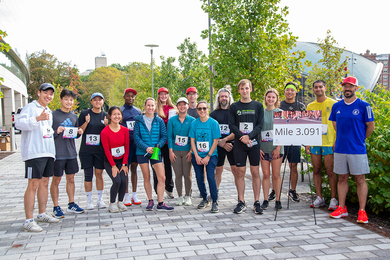On April 4, a suspected nerve gas attack killed at least 80 in Khan Sheikhun, in Syria’s Idlib Province. Nikki Haley, the U.S. Ambassador to the United Nations and the current UN Security Council president, stated shortly after the incident that members "are hoping to get as much information” as they can about the event.
Jeanne Guillemin, a medical anthropologist and a senior fellow in the MIT Security Studies Program, recently answered a few questions on the attack. Guillemin is an authority on biological weapons and has published four books on the topic. Her latest, "Hidden Atrocities: Japanese Germ Warfare and American Obstruction of Justice at the Tokyo Trial," will be published by Columbia University Press in September.
Q. What do we now know about the attack?
A. The process of investigation will be difficult, given the ongoing war and secrecy on the part of Syria and others. It seems certain that the regime of Syria’s President al-Assad or some element thereof not only violated treaty obligations regarding chemical weapons but could be complicit in a major war crime.
On a technical level, the chemical agent that caused more than 80 deaths and many injuries has been identified by the United Kingdom as sarin, which accords with medical records. The timing of the attack was April 4 at just before 7 a.m. local time, optimal for dispersal. Much less or nothing is reliably known regarding the munition and its source.
The Organization for the Prohibition of Chemical Weapons (OPCW), the operational arm of the Chemical Weapons Convention (CWC) in The Hague, is the lead agency for investigating the nerve gas attack. The OPCW can count on assistance from the United Nations Joint Investigative Mechanism (JIM), created by the Security Council with all permanent members in agreement. OPCW investigations are kept secret until the final reports are released, which can take months, and their mandate does not extend to identifying perpetrators. The mandate of the JIM is broader and does extend to estimating perpetrators, which makes its eventual report important.
Q. Based on your expertise on the historical use of chemical weapons, why would Assad strike now? Is he likely to strike again?
A. The use of chemical weapons in war, starting in April 1915 with the German release of chlorine gas on Allied trenches at Ypres, has invariably been to break an impasse by targeting a defenseless enemy, those lacking protection such as gas masks or antidotes. For Syria, frustration with rebel holdouts in Idlib Province may have provoked the attack; one wonders, though, exactly what authorities reasoned that killing civilians with nerve gas could be carried out without controversy — and without jeopardizing the new potential for cooperation with the Trump administration.
The political furor created by the social media images of the victims make it unlikely that President al-Assad, if he ordered or permitted the attacks, would venture any more. For years, though, Syria has been getting a pass from the international community regarding its less-than-complete compliance with the CWC, to which it acceded in October 2013. In 2014, the belief that Syria’s declaration of its chemical weapons contained gaps and inconsistencies prompted the Director-General of the OPCW to send a special team of technical investigators on 18 trips to Syria to do what proved impossible: to verify that Syria’s declaration was in accordance with the CWC. The UN Security Council was fully advised of OPCW reports, but no action was taken to bring Syria in line.
Currently the Russian government is taking al-Assad's protestations of innocence at face value. At the same time, though, Foreign Minister Sergey Lavrov has spoken strongly in favor of UN investigations and asserted that Syria will be forthcoming about its military activities in the region at the time of the April 4 sarin attack. If evidence points clearly to al-Assad’s forces, which the U.S. government has already publicly blamed, Putin will have to address the difficult problem of regime change in Syria — or risk his own legitimacy by supporting a Syrian president many feel is at best a loose cannon and at worst the murderer of his own people.
Q. What are psychological and physical effects of this kind of attack, and how does one determine who was responsible?
A. Follow-up information from the 1988 chemical attack in Halabja, Iraq, and the 2013 chemical attack in Ghouta, Syria, illustrates the terrifying impact of aerial chemical attacks on defenseless populations already under siege.
In Halabja, the attacks with blistering mustard and with sarin, combined with conventional bombings, were part of Saddam Hussein’s punitive objective to eliminate the Kurds from Iraq.
The unusual strikes on Ghouta and Khan Sheikhun seem more intended to terrify Syrian civilians, that is, to frighten survivors and witnesses (even those watching on the internet) into submission to the enemy aggressor, whose power to rapidly asphyxiate hundreds must seem mythic, especially when done with impunity, without legal repercussions.
Over time, the criminal responsibility for the April 4 sarin attack might be put on Syrian officials, who may well be prosecuted at the International Criminal Court (ICC). The court’s statute contains language banning the use of poisons taken directly from the Geneva Protocol; the prosecution of murderous attacks on defenseless populations is, of course, central to the ICC mission, regardless of means. The broader responsibility for what has happened in Syria and for the extreme vulnerability of its civilian population throughout the war lies with the international community. This week, one hears the Chinese delegate to the United Nations calling for a political solution, rather than a military showdown between the United States and Russia. After this latest barbarism, is it too much to ask for international safe zones and a cease fire?









